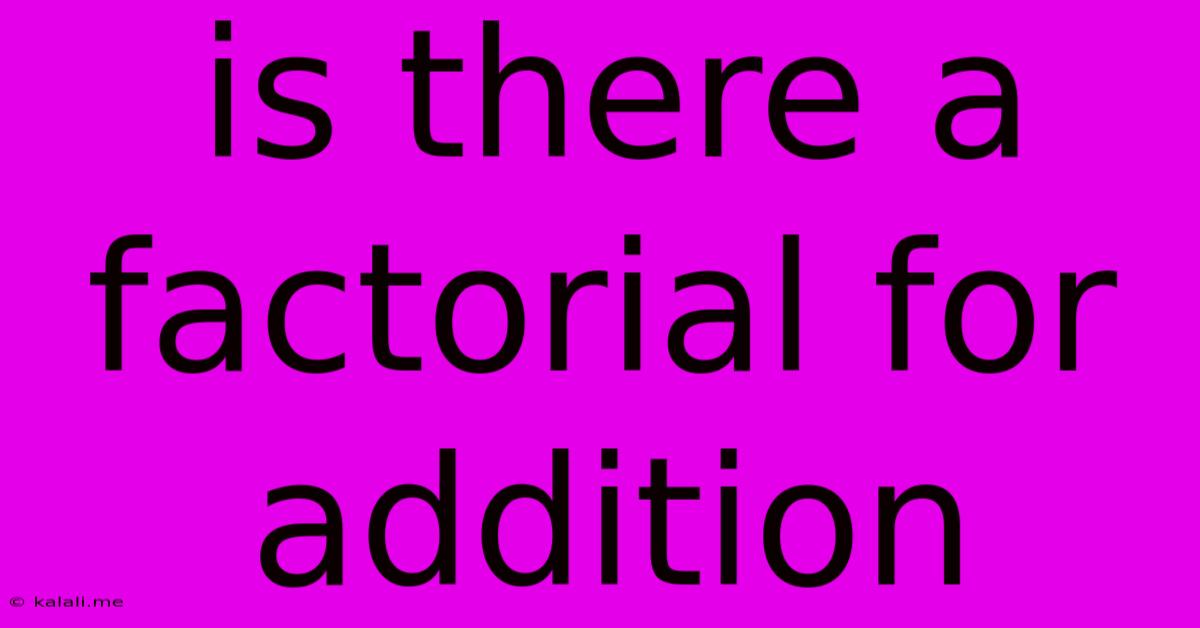Is There A Factorial For Addition
Kalali
Jun 02, 2025 · 3 min read

Table of Contents
Is There a Factorial for Addition? Exploring the Concept of Additive Analogues
The factorial function, denoted by the exclamation mark (!), is a fundamental concept in mathematics, widely used in combinatorics and probability. It's defined as the product of all positive integers up to a given number. For example, 5! = 5 × 4 × 3 × 2 × 1 = 120. But what about addition? Is there a comparable operation that acts as a "factorial" for addition? This article explores this intriguing question, examining the concept and its limitations.
While there isn't a direct, universally accepted equivalent of the factorial for addition, we can explore analogous concepts that capture a similar spirit of repeated operation. The core idea behind the factorial is repeated multiplication; we're looking for something akin to repeated addition.
Understanding the Differences Between Multiplication and Addition
Before diving into potential analogies, it's crucial to understand the fundamental differences between multiplication and addition. Multiplication is essentially repeated addition. For instance, 5 × 3 is the same as 3 + 3 + 3 + 3 + 3. However, the factorial involves progressively decreasing multipliers, a feature not directly mirrored in simple repeated addition.
Potential Analogies and Their Shortcomings
Several approaches attempt to create an additive counterpart to the factorial:
-
Summation of consecutive integers: The sum of consecutive integers from 1 to n is given by the formula n(n+1)/2. This formula efficiently calculates the sum, much like the factorial calculates the product. However, it doesn't directly mirror the recursive nature of the factorial. It's a closed-form solution, not a repeated operation in the same way.
-
Repeated addition with a sequence: We could define a sequence and then repeatedly add its elements. For instance, starting with the sequence 1, 2, 3, 4, 5, we could define an operation where we add these numbers successively. However, this isn't a direct analog to the factorial, as it lacks the inherent decreasing multiplier characteristic.
-
Recursive approaches: We could try to create a recursive definition. A naive attempt might be something like A(n) = n + A(n-1), with A(1) = 1. This yields the triangular numbers, the same as the sum of consecutive integers. Again, it's elegant and useful but isn't a true additive "factorial."
The Importance of Context and Specific Applications
The absence of a direct additive counterpart to the factorial doesn't diminish its importance. The factorial's role in combinatorics and probability stems from its representation of permutations and arrangements. Additive analogs might be relevant in different contexts, such as specific problems involving sums of sequences or series. The key is to define the problem clearly and determine the most appropriate mathematical tool, be it a summation formula or a recursive approach.
Conclusion: No Perfect Equivalent, But Useful Analogies Exist
While a perfect "factorial for addition" doesn't exist, various mathematical concepts offer valuable analogies. The sum of consecutive integers, represented by n(n+1)/2, provides a concise way to calculate the sum, similar to how the factorial calculates the product. Recursive approaches can also model additive sequences, though these don't precisely replicate the recursive nature of the factorial. Ultimately, the best approach depends on the specific problem and the properties being emphasized. Understanding the fundamental differences between multiplication and addition is key to appreciating the limitations and opportunities when searching for analogous operations.
Latest Posts
Latest Posts
-
We Seek An End To Suffering
Jun 04, 2025
-
Set Opacity Of Notes In Mac
Jun 04, 2025
-
Latex Less Than Or Equal To
Jun 04, 2025
-
Cant Get A Job Without Lying
Jun 04, 2025
-
How To Remove Little Dents From Car
Jun 04, 2025
Related Post
Thank you for visiting our website which covers about Is There A Factorial For Addition . We hope the information provided has been useful to you. Feel free to contact us if you have any questions or need further assistance. See you next time and don't miss to bookmark.